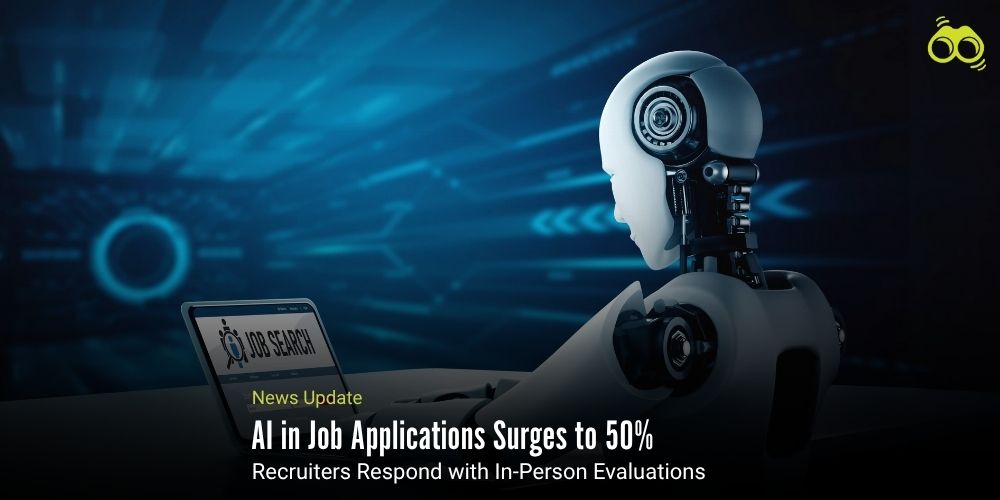Universities Urged to Equip Students with Human Skills in an AI-Driven Era
AI Reshapes Job Hunting: Experts Warn of Growing Challenges for Young Professionals
Artificial Intelligence (AI) is rapidly transforming the way individuals approach job applications, reshaping how candidates present themselves and how employers evaluate talent. From generating tailored CVs and cover letters to simulating interview responses, AI tools are enabling applicants to submit polished, personalised applications at scale. This shift is changing the traditional hiring landscape, prompting recruiters to question whether submissions genuinely reflect a candidate’s skills or are largely machine-generated.
In response to this evolving dynamic, Teach First, one of the United Kingdom’s leading graduate recruiters, is accelerating its move to in-person, task-based assessments. Known for placing graduates into teaching roles through a fast-track programme, the organisation is moving away from written assignments, which are increasingly susceptible to AI-generated content. Instead, candidates will be asked to deliver short “micro lessons” in front of assessors, allowing for a more direct and authentic evaluation of their teaching potential.
This strategic shift follows research by Bright Network, which revealed that AI use in job applications has surged from 38% last year to 50% this year. Patrick Dempsey, Executive Director for Programme Talent at Teach First, reported a 30% rise in applications compared to the same period last year. He attributed this increase to both a weaker job market and the ease with which graduates can now apply to multiple roles using AI tools. He also mentioned that some candidates had accidentally submitted responses containing leftover ChatGPT text, resulting in automatic rejection.
As the use of AI becomes more widespread, over a quarter of employers surveyed by Bright Network are preparing to introduce formal guidelines on AI usage in job applications ahead of the next recruitment season. Kirsten Barnes, Head of Digital at Bright Network, explained that AI tools are enabling candidates, regardless of age, to apply for multiple positions rapidly, resulting in a significant surge in submissions and increased competition.
As AI reshapes how applications are submitted, its impact is also being felt across the wider job market. Research by job platform Adzuna revealed that vacancies for graduate roles, apprenticeships, and internships have dropped by 32% since the launch of ChatGPT in November 2022. These positions now make up just 25% of the UK job market, down from 28.9% in 2022. Similarly, job site Indeed reported a 33% drop in graduate job postings as of mid-June compared to the same period last year, marking the most difficult market for university graduates since 2018.
Offering a more balanced perspective, the Institute of Student Employers found in a survey of 69 employers that while graduate vacancies fell by 7%, school-leaver opportunities rose by 23%, leading to a modest 1% overall increase in early-career roles. Likewise, Group GTI, a student-focused charity, reported an 8% rise in job listings on UK university careers boards, suggesting a degree of resilience in the graduate job market.
However, not all AI use has been ethical or transparent. Dartmouth Partners, a financial services recruitment agency, reported cases where applicants embedded keywords in white font on their CVs. These words, invisible to human reviewers but detectable by automated screening systems, were used to manipulate AI algorithms and increase the chances of progressing to the next recruitment stage.
Recruitment experts agree that while AI has not yet caused widespread disruption for school and university leavers, its influence is growing. Young professionals will need to build AI literacy to remain competitive in an evolving job landscape. James Reed, CEO of the Reed employment agency, expressed concern for graduates burdened with student debt who now face a challenging job market. He urged universities to better prepare students for today’s employment realities and predicted that AI would fundamentally reshape recruitment within the next five years. AI is redefining both the application process and recruitment strategies, compelling organisations to adopt more human-centred assessments to ensure fairness, authenticity, and genuine talent recognition.
Editor’s Note:
There was a time when writing a CV meant spending hours carefully listing achievements, qualifications, and experiences. Now, that process has changed completely. For many Gen Z and Millennial job seekers, over 49% rely on AI tools to create applications in just seconds. While this saves time, it raises a key question: do these AI-generated applications truly show a person’s real abilities? The growing use of AI is changing how young professionals apply for jobs. Tools like ChatGPT can now create impressive CVs, customised cover letters, and even practice interview answers. But as applications become more polished with AI help, it becomes harder to tell whether they reflect the applicant’s true skills. While AI brings speed and accessibility, it also makes the hiring process less personal and harder to judge fairly. Teach First’s move towards in-person, task-based assessments shows how the recruitment sector is responding. With rising competition in the job market, especially for graduates, employers are rethinking how they spot genuine talent in an AI-driven world.
Universities must act quickly. Students need to learn not just how to use AI wisely, but also build essential human skills like communication, creativity, emotional intelligence, and critical thinking skills that AI can’t replace. Recruiters, too, must strike a balance: using technology for efficiency while ensuring the hiring process remains fair and real. Skoobuzz believes the growing reliance on AI is a sign that urgent changes are needed. If we don’t act now, we risk losing the human qualities that make candidates truly stand out. Strategic action is the only way to ensure AI enhances opportunities without replacing authenticity.














0 Comments (Please Login To Continue)